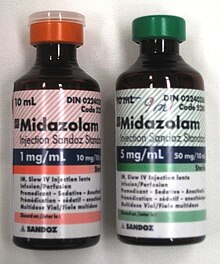Midazolam is a medication that has been used for decades, but many people are unaware of its classification as a benzodiazepine. Benzodiazepines are a class of drugs that are used to treat a variety of ailments, such as anxiety, insomnia, and seizures. In this article, we will explore how midazolam fits into the benzodiazepine family and its potential risks and benefits.
Yes, Midazolam is a benzodiazepine. It is a type of medication used to induce sedation and sleep. Midazolam is typically used in a medical setting to help relax a person before a procedure. It is also used as a pre-medication for anesthesia or sedation during surgery. Midazolam can be taken orally, intranasally, or intravenously. Side effects of midazolam may include drowsiness, confusion, and memory problems.
What is Midazolam?
Midazolam is a benzodiazepine medication used to induce and maintain sedation, as well as to induce amnesia and muscle relaxation. It is commonly used in surgical or medical procedures to relieve anxiety, produce sleepiness, and to decrease memory of the procedure. Midazolam is a short-acting benzodiazepine, meaning its effects last for a short period of time.
Uses of Midazolam
Midazolam is commonly used as a sedative-hypnotic drug to produce sleepiness and calmness during medical procedures. It is often used to relieve anxiety and can be used as a premedication before surgery. Midazolam is also used to induce amnesia, which is the inability to recall events that occurred during the time the drug was taken.
Midazolam is also used to control seizures in certain medical situations. It is often used as an adjunct to other anticonvulsant medications to prevent and control seizures.
Side Effects of Midazolam
Midazolam can cause side effects such as drowsiness, dizziness, confusion, coordination problems, and respiratory depression. It can also cause changes in mood, behavior, and thinking, as well as memory problems. Other side effects include headache, nausea, vomiting, constipation, blurred vision, and dry mouth.
Risks of Midazolam
Midazolam can cause serious side effects including respiratory depression, hypotension, and coma. It can also have severe interactions with other drugs and can cause withdrawal symptoms if stopped abruptly.
Is Midazolam a Benzodiazepine?
Midazolam is a benzodiazepine medication, meaning it is a central nervous system depressant that binds to the benzodiazepine receptor in the brain. It works by increasing the activity of the neurotransmitter GABA, which helps to reduce anxiety, muscle tension, and seizures. Midazolam is a short-acting benzodiazepine, so its effects last for a short period of time.
Dosage and Administration
Midazolam is usually administered intravenously, intramuscularly, or orally. The dosage and administration of midazolam depend on the patient’s age, medical condition, and other medications that the patient is taking. It is important to follow the instructions of a healthcare provider when taking midazolam.
Safety of Midazolam
Midazolam should be used with caution in the elderly, as well as in people with certain medical conditions such as liver or kidney disease. It is important to tell your healthcare provider about any medical conditions and all medications that you are taking. Midazolam should not be used in pregnant or breastfeeding women.
Few Frequently Asked Questions
What is Midazolam?
Midazolam is a benzodiazepine medication. It is a short-acting drug that is used for sedation, anxiolysis, and to induce anesthesia before surgery. It can also be used to treat seizures, especially those caused by alcohol withdrawal. Midazolam is sold under the brand names Dormicum, Hypnovel, and Versed. It is available in injectable, tablet, and syrup form.
What are the effects of Midazolam?
Midazolam has several effects. It can produce sedation, anxiolysis, and muscle relaxation. It can also reduce anxiety, reduce pain, and produce a feeling of euphoria. It can also cause respiratory depression, hypotension, and memory impairment.
Is Midazolam a Benzodiazepine?
Yes, Midazolam is a benzodiazepine. It is classified as a Schedule IV controlled substance in the United States, meaning it has a low potential for abuse and dependence. It is used in a medical setting to treat anxiety, insomnia, and seizures.
What is the dosage for Midazolam?
The dosage for Midazolam will vary depending on a patient’s age, medical condition, and other medications that may be taken. Generally, the recommended dosage for adults is 1-2 mg given intravenously, intramuscularly, or orally. The dosage for children is 0.05-0.2 mg/kg body weight given intravenously or intramuscularly.
What are the side effects of Midazolam?
The most common side effects of Midazolam include drowsiness, confusion, dizziness, impaired coordination, and impaired judgment. Other side effects may include headache, nausea, vomiting, constipation, blurred vision, and dry mouth. In rare cases, more serious side effects may occur, including respiratory depression, hypotension, and coma.
Who should not take Midazolam?
Midazolam should not be taken by people with a history of drug or alcohol abuse, as this can increase the risk of dependence and overdose. People with certain medical conditions, such as liver or kidney disease, should not take Midazolam. It should also be avoided in pregnant or breastfeeding women, as it can cause harm to the fetus or baby.
2-Minute Neuroscience: Benzodiazepines
Midazolam is a benzodiazepine that has been used for decades to treat a variety of conditions. It is an effective medication that is generally safe when used as directed. There are, however, potential side effects and interactions that should be discussed with a healthcare professional prior to use. It is important to know the risks associated with taking midazolam and to use it responsibly to ensure the best possible outcome.


